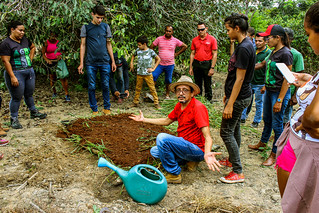Xingu farmers start building PAIS
About a month ago, the families benefiting from the “Use of social technologies to reduce deforestation” project in the Xingu region (PA) began building the PAIS (Integrated and Sustainable Agroecological Project). The technical team has been visiting each family to help with the initial demarcation of the beds and the chicken coop, while they await the arrival of the production and irrigation kits.
So far, 23 units have been started. All of them are being built in collective efforts carried out with the participation of the project’s technical team, families affected by dams and the beneficiary families. The families covered are in the communities of Agrovila Carlos Pena (Brasil Novo), Pioneira, Assurini and Princesa do Xingu (Altamira) and Km 20 (Vitória do Xingu).
“As well as producing for consumption, with this garden we will also be able to sell and encourage people to produce and consume organic food, saying no to pesticides. It’s a project that comes in handy at a time when people are using a lot of agrochemicals in their production and this is destroying our land and our water,” says Josélia, one of the project participants and a resident of the Pioneira community (Altamira).
She also comments on the benefits of using solar energy for the irrigation system: “If you were to irrigate a vegetable garden of this size with ordinary energy, you would spend too much, because energy is very expensive in Pará. So it’s very good that we can use solar energy. It’s something very innovative for our region and it will certainly help to reduce energy bills,” he says.
In all, 48 families will be covered in the Xingu region at this stage of the project. “The forecast is that next year another 12 families who had problems with their documentation will be able to have their situation regularized and take part in the project,” says Jackson Dias, ADAI’s technician in the region.



